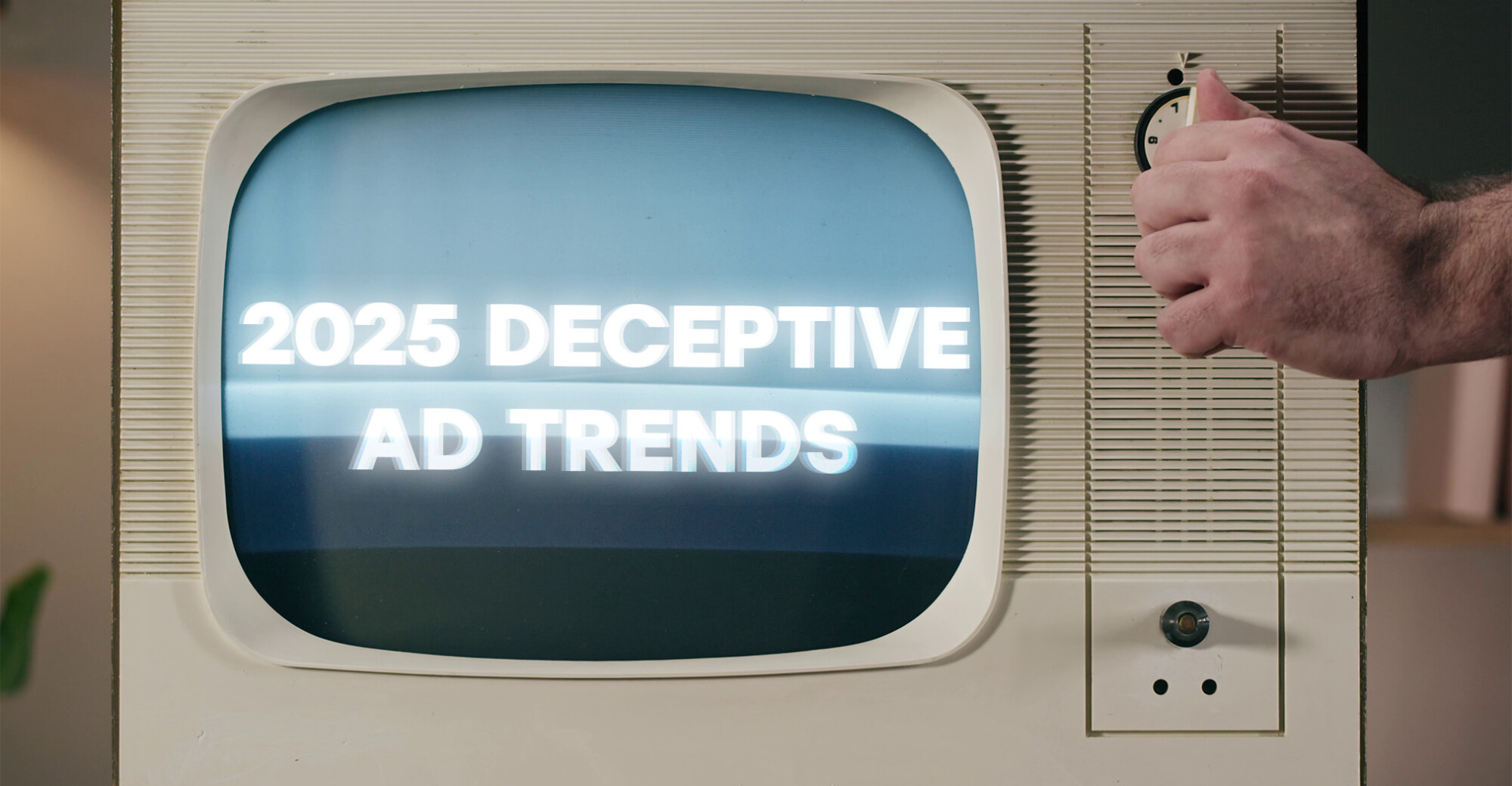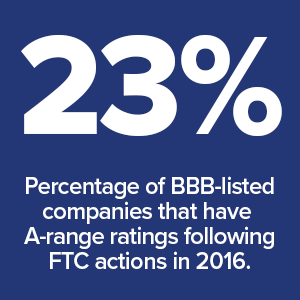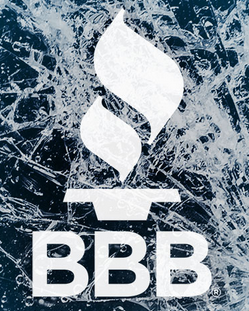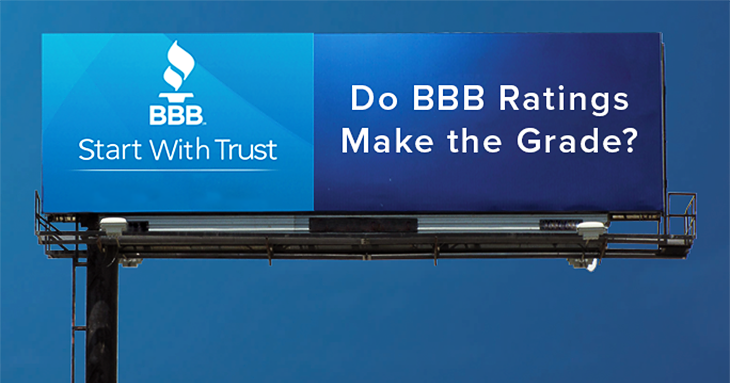
2025 Deceptive Ad Trends
A closer look at what we’ll be monitoring in the new year.
TINA.org investigation finds more than a dozen companies in good standing with the BBB following an FTC action.
Last September, NutraClick, a supplement marketer whose products are sold on the internet and in retail stores, agreed to turn over $350,000 in what the FTC termed “ill-gotten gains” to settle the agency’s charges that it lured consumers to sign up for “free” samples online only to charge them later for additional products without their consent.
The unauthorized recurring charges amounted to tens of millions of dollars in injury to consumers, according to the FTC’s complaint, which noted that “at least 70,000 consumers” complained about the scheme to their bank, credit card company, law enforcement, or the Better Business Bureau (BBB).
Yet in the months following the settlement, NutraClick never lost its accreditation with the BBB and it has an A rating. While an alerts and action page on the company’s BBB profile notes the FTC action, it omits certain figures cited in the FTC complaint, such as the tens of thousands of consumers who complained about the company’s deceptive billing practices. The BBB only lists five customer complaints in the past three years.
But NutraClick isn’t the only company to maintain high marks with the BBB despite facing FTC action in 2016. A TINA.org investigation has found more than a dozen instances in which a company settled deceptive advertising charges with the FTC yet has a rating in the A range.
 The companies include for-profit DeVry University, which reached a $100 million settlement with the FTC — the second largest last year — after the agency filed a lawsuit alleging that the university misrepresented the likelihood of graduates getting a job and what they could earn after obtaining their degree. The university has an A- rating.
The companies include for-profit DeVry University, which reached a $100 million settlement with the FTC — the second largest last year — after the agency filed a lawsuit alleging that the university misrepresented the likelihood of graduates getting a job and what they could earn after obtaining their degree. The university has an A- rating.
Other companies that still have ratings in the A range after FTC actions include a dog food company that advertised that its kibble could extend a dog’s lifespan by 30 percent or more that the agency charged did not have sufficient evidence to back up its claim (Eukanuba); a marketer of wristbands that advertised that the products could protect against mosquito bites that the FTC charged did not have sufficient supporting evidence (Viatek); and a movie studio that settled FTC charges that it deceived consumers in a marketing campaign for its video game by failing to adequately disclose that it paid “influencers” to post positive gameplay videos on social media (Warner Bros.). In total, these companies agreed to pay more than $107 million to settle FTC charges in 2016 yet still remain in good standing with the BBB.
A handful of businesses actually saw their BBB rating improve following an FTC action last year, despite the BBB’s policy that states it may deduct as many as 25 points following a finalized government action.
Original Organics, for example, jumped two letter grades, from an F to a C, after settling agency charges that it swindled more than $16 million from consumers who bought its “worthless” weight-loss supplements.
Forty of the 64 companies listed on the BBB that the FTC took action against in 2016 on deceptive marketing charges have “No Rating” or an F rating. See the full list here.
“Not a consumer watchdog”
The BBB portrays companies in good standing with the organization as reputable firms worthy of consumers’ business. In its marketing, the BBB advises consumers to “look for the seal” of accreditation and “Trust BBB Accredited Businesses.” And it pitches accreditation to companies saying that consumers are 83 percent more likely to make a purchase when a business displays the blue BBB seal of accreditation.
 Yet, the BBB admits that there is a common misperception that the organization is a consumer watchdog.
Yet, the BBB admits that there is a common misperception that the organization is a consumer watchdog.
RELATED: Ad or Not? Melaleuca’s Bright and Shiny BBB page
In reality, the BBB operates as a mediator between aggrieved consumers and companies, with ratings based largely on how a company responds to customers who complain within the BBB’s own system. Companies pay annual membership fees to the BBB that can add up to thousands of dollars to be accredited. Companies applying for accreditation must agree to abide by the BBB’s Code of Business Practices, which, among other things, requires that they make several commitments to truthful advertising.
But the organization provides this caveat on its website on a page explaining to businesses how they can become accredited:
BBB accreditation does not mean that the business’s products or services have been evaluated or endorsed by the BBB, or that BBB has made a determination as to the business’ product quality or competency in performing services.
Making (and keeping) the grade
The BBB gives a multitude of reasons for why a business’ accreditation may be revoked or its rating lowered, including a “finalized” government action.
A business’s BBB rating is lowered when BBB has knowledge of … finalized government actions against the business that relate to its marketplace activities and, in BBB’s opinion, raise questions about the business’s ethics or its reliability in providing products/services. Government actions may be rated as major, moderate or minor, and the rating deduction varies accordingly. However, older government actions have less of an impact than newer government actions of the same type.
A recent FTC settlement would seem to fall squarely into the category of a finalized government action, which the BBB’s rating system indicates can result in as much as a 25-point deduction. On the BBB’s 100-point scale, such a drop in rating would knock an A-, A, or A+ rating down two or three letter grades. But this was not the case with 14 companies that settled with the FTC in 2016. DeVry University, for example, only saw its A+ rating slide to an A- and was able to keep its accreditation.
LearningRx also held onto its accreditation and has an A+ rating following an FTC settlement in which it agreed to pay $200,000 to settle allegations that it did not have sufficient support to claim that its “brain training” programs could improve serious cognitive conditions such as ADHD, autism, dementia and Alzheimer’s disease.
Complaints piling up
For some companies whose BBB ratings were lowered following an FTC action in 2016, consumers had already been alerting the organization to signs of problems for some time.
For example, one month before the FTC filed a complaint against NetSpend alleging it misled consumers with claims that its prepaid debit cards gave them “immediate access” to their money, the company had more than 3,200 customer complaints filed with the BBB, while also boasting an accredited A rating. One consumer wrote at the time:
Net spend has had my account locked with a block for three days no one will remove the block on my account. This account has had a direct deposit in the amount of $1465.68 … they have had this account blocked took fees but would not release my cash this has… caused my children to go hungry for two days and no one in customer service cares.
Following the FTC’s complaint, NetSpend’s BBB status changed to “No Rating.”
BBB responds
TINA.org reached out to the BBB for comment on their ratings. This is their response.
The takeaway for consumers
A company’s accreditation or impressive rating with the BBB should not be the only determining factor in evaluating a business. Consumers may want to review the types of complaints filed with the BBB to see if there are any patterns in the complaints suggestive of a continuing problem. Consumers researching a company may also want to check with the FTC, the CFPB, and their consumer protection officials. Finally, search the internet to find out what others have to say about the business, on forums where publishers are not compensated by the very businesses they accredit.
EDITOR’S NOTE 2/23/17: Despite repeated requests for substantiation regarding the BBB’s public statement that there were “errors” in this article, the BBB has not provided TINA.org with evidence of any. Additionally, since the publication of TINA.org’s findings, the BBB changed the ratings of several companies that faced FTC action in 2016. As of 2/23/17, it lowered the grades of five companies — two of which remain in the A range despite the downgrade — switched one company’s A rating to “No Rating,” and updated one company’s “No Rating” to an A-. One company’s rating went from an A+ to an A and then back to an A+. See changes here.
A closer look at what we’ll be monitoring in the new year.
And the regulatory efforts that seek to curb them.
This year reader tips led to dozens of ad alerts, as well as a complaint to regulators.


